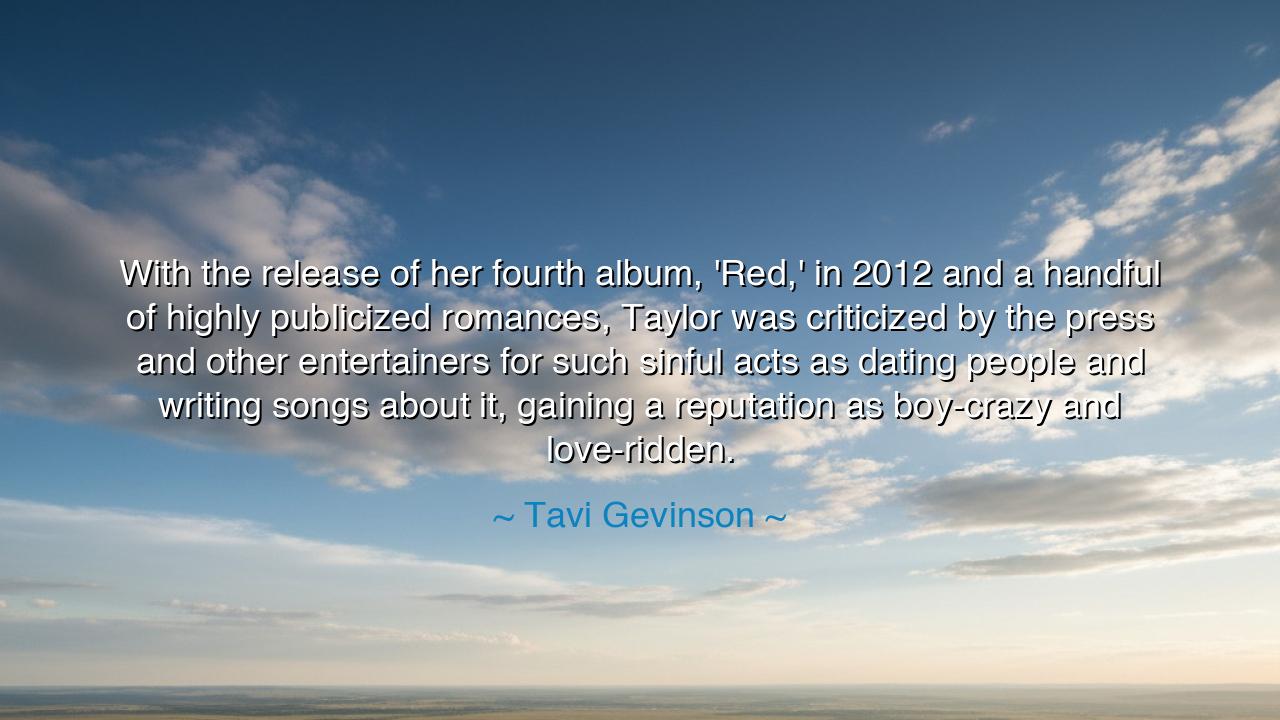
With the release of her fourth album, 'Red,' in 2012 and a
With the release of her fourth album, 'Red,' in 2012 and a handful of highly publicized romances, Taylor was criticized by the press and other entertainers for such sinful acts as dating people and writing songs about it, gaining a reputation as boy-crazy and love-ridden.






When Tavi Gevinson wrote, “With the release of her fourth album, ‘Red,’ in 2012 and a handful of highly publicized romances, Taylor was criticized by the press and other entertainers for such sinful acts as dating people and writing songs about it, gaining a reputation as boy-crazy and love-ridden,” she spoke not merely of Taylor Swift, but of a timeless struggle — the battle between authentic expression and society’s judgment. Beneath the irony of her words lies a deep current of truth: that a woman’s honesty about love, pain, and desire has too often been met with scorn rather than celebration. Gevinson’s reflection is both a defense and a revelation — a reminder that art born of vulnerability is sacred, and that those who create from the heart will always unsettle those who fear sincerity.
The origin of this quote lies in the tumultuous period following the release of Swift’s album “Red,” a record that captured the rawness of young love — its beauty, its heartbreak, its chaos. Yet instead of recognizing the courage in such honesty, many voices turned to mockery. Critics and entertainers painted her as “boy-crazy,” as though her art was an indulgence rather than an achievement. What Gevinson exposes here is not just a moment in Swift’s career, but a cultural hypocrisy that has echoed for centuries: the world admires vulnerability in theory, but punishes it in women who live it aloud.
To the ancients, the act of creation was divine. The poets of old — from Sappho on the island of Lesbos to Catullus in the heart of Rome — poured their hearts into verse, transforming longing into immortality. Sappho wrote of her desire and heartbreak with such grace that her words still tremble across millennia, yet even she was scorned in her time for daring to write so honestly. In this lineage stands Taylor Swift — a modern poet of melody — and Gevinson’s words echo the ancient defense of the artist’s right to feel deeply, to turn emotion into art, and to live unashamed of either.
What Gevinson calls “sinful acts” — the acts of loving, losing, and writing — are, in truth, the very essence of humanity. Yet society has long feared the woman who claims ownership of her narrative. History tells us of Mary Wollstonecraft, who was condemned for her romantic entanglements even as her writings helped shape modern thought. We recall Sylvia Plath, whose anguish was dissected more eagerly than her genius was celebrated. The world, it seems, prefers women silent in their suffering — yet the artist refuses silence, turning wounds into song. Swift’s “crime,” as Gevinson frames it, is not her love life, but her refusal to hide it.
There is a heroism in this defiance — the courage to turn gossip into greatness, to transform judgment into art. The album “Red” itself is not a diary of weakness, but a testament to strength: the ability to name one’s emotions and give them form. Each lyric became both confession and conquest, turning pain into beauty. This is what Gevinson understood — that Swift’s reputation as “love-ridden” was not a mark of shame, but a crown earned through vulnerability. The artist, like the warrior, must face misunderstanding as the price of truth.
And so we arrive at the lesson within this reflection: never let the world’s scorn silence your truth. The ancients taught that authenticity is the highest form of courage. To speak — to sing — from one’s own heart is to invite both admiration and attack. Yet those who create honestly forge legacies far stronger than those who mock them. The laughter of cynics fades quickly; the words of the brave endure forever. Let every artist, every soul who feels deeply, remember that creation is sacred rebellion — a defiance against the dullness of pretense.
Finally, let Gevinson’s defense of Swift remind us that art is born from courage, not approval. The world will always misjudge what it cannot understand. Yet, as the philosophers once said, the task of the wise is not to please the crowd but to speak the truth. Taylor Swift’s “Red” was not just an album — it was an offering, a modern hymn to love’s complexity. And those who mocked her for it only proved how necessary such voices remain. So, let us follow this wisdom: write your own songs, speak your own truth, and never apologize for feeling deeply. For in a world that fears sincerity, to be honest is the most revolutionary act of all.






AAdministratorAdministrator
Welcome, honored guests. Please leave a comment, we will respond soon